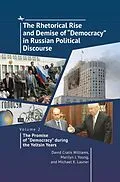Post-Soviet Russia in the 1990s saw a surge in civic participation. The traditional power structure officially relinquished control of political rhetoric and a nascent civil society had begun to emerge. Free elections and political partisanship between reformist and conservative elements of Russian society, spurred on by Russia's economic troubles, gave a "Wild West" tenor to public rhetoric that was reflected in the election campaigns of 1993, 1995, and 1996. In this volume, the authors examine, through a series of contemporaneously written essays, the arc of government rhetoric during the height of media freedom, the quest for a new national identity, and the struggle for self-government.
Autorentext
David Cratis Williams is Professor of Communication and Rhetorical Studies at Florida Atlantic University. His scholarship focuses on argumentation, rhetorical theory, and criticism; he is a recognized authority on Kenneth Burke. His work on Russian political discourse began during a meeting in Russia in January 1992.
Inhalt
List of Photos Acknowledgements Contributors Note to Readers
Alexander Yuriev Alexander Yuriev
Dedication: Alexander Ivanovich Yuriev (1942-2020) Alexander Yuriev
Preface
Marilyn Young at a Political Communication Conference
Introduction to Volume Two
Yeltsin and Gorbachev
Part One: Framework for Understanding the Immediate Post-Soviet Political Environment: Ecological Depredation, Economic Challenges, the Press, and National Identity
Yeltsin Standing on a Tank 1991
A New Day for the Soviet Environment
The Former Soviet Union Leaves Environmental Legacy of Shame
Review of Environmental Management in the Soviet Union by Philip R. Pryde
Russian Scientists Struggle to Survive
Review of The Russian Press from Brezhnev to Yeltsin: Behind the Paper Curtain by John Murray
Argumentation, Globalization, and the New Nationalism: Implications and New Directions
Part Two: Politics and Political Argumentation during the Yeltsin Years
Democratization and Cultures of Communication: The Mission of the International Center for the Advancement of Political Communication and Argumentation
The Role of Public Argument in Emerging Democracies: A Case Study of the December 12, 1993, Elections in the Russian Federation
Analysis of Political Argumentation and Party Campaigning Prior to the 1993 and 1995 State Duma Elections: Lessons Learned and Not Learned
Argument and Political Party Formulations: A Continuing Case Study of Democratization in the Russian Federation
Russian Electoral Politics and the Search for National Identity
Yeltsin Campaign Photograph
Runoff Election Sample Ballot
Choose or Lose: Campaign Button
Choose or Lose: T-shirt Front
Choose or Lose: T-shirt Back
Choose or Lose: Globe and Barbed Wire
Choose or Lose: Jeans Jacket and Prison Garb
Frameworks for Russian Identity: Arguing the Past, Defining the Future
Historical Metaphor and the Search for National Identity in Russia
Russia's First Elected President Buries Its Last Czar: Reclaiming Cultural Memory in the Search for National Identity
Part Three: Yeltsin's Multiple Political Profiles (The Three Faces of Boris)
Yeltsin as an Autocrat: The "Constitutional Crisis of 1993" as the Beginning of the End of Russian Democracy
Shelling of the White House
Shelling of the White House
Shelling of the White House
Yeltsin as a Democrat: A Lexical Content Analysis of his Presidential Addresses to the Federal Assembly 1994-1999
Yeltsin as a Man of the People: A Case Study of His Campaign Rhetoric during the 1996 Russian Presidential Election
Yeltsin on the Campaign Trail
Part Four: Looking Backward, Looking Forward
Ten Years of Frustration: Transitional Rhetoric and Democratization in the Russian Federation
The Fear of Politics and the Politics of Fear in Russia-Images in the US Media
Echoes of Berlin 1989: Post-Soviet Discourse and the Rhetoric of National Unity
Foreign Policy Challenges and The Historical "Anchors" of Russian Federation Foreign Policy after September 11, 2001
Alexei Salmin
Instant Democracy: Rhetorical Crises and the Russian Federation, 1991-2007
Yeltsin and Putin in the President's Office
Afterword
Index Bibliography
